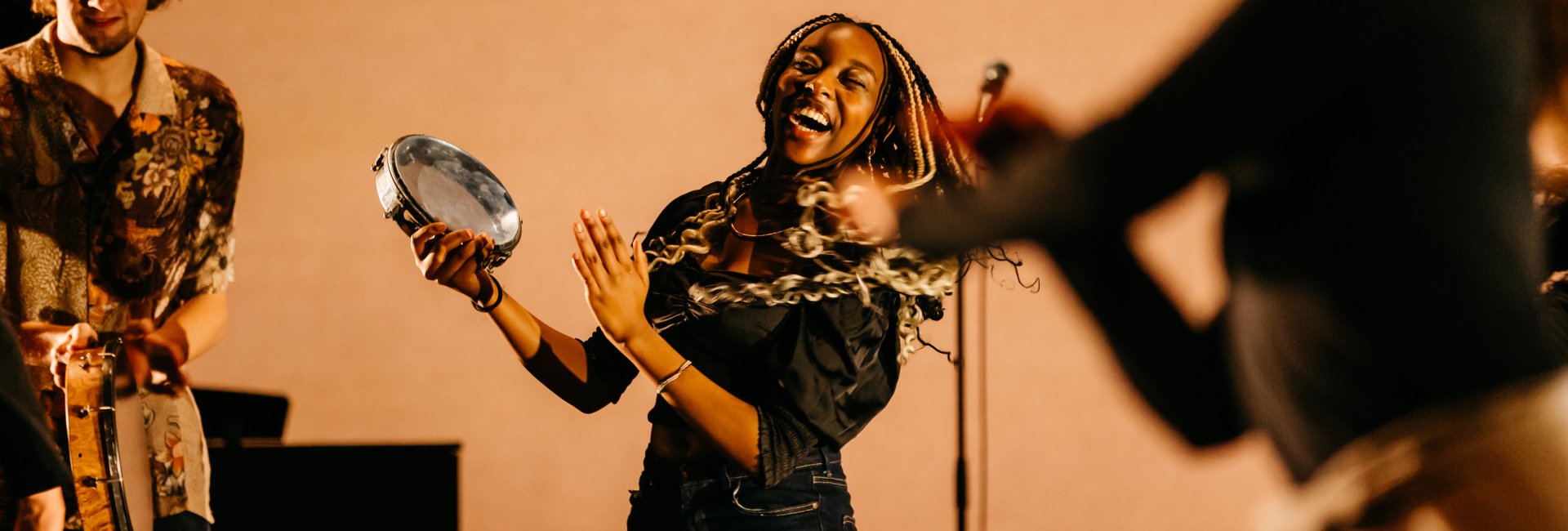Trinity Laban Conservatoire of Music and Dance
King Charles Court
Old Royal Naval College
Greenwich
SE10 9JF
Visit our website Visit our course page
Course contact details
Admissions
Email:admissions@trinitylaban.ac.uk
Phone:+44 (0)20 8305 4444


Creative Music Making is a blended programme of study, developed by Trinity Laban in partnership with the Open Universit. It is delivered through distance (online) learning plus a residential learning week at Trinity Laban’s World Heritage Site home in Greenwich. The Certificate is available as a stand-alone programme, and can also count towards degree study with the Open University. The Certificate is designed for instrumentalists and vocalists who participate in any genre of music and there are no auditions to gain entry. It is suited to those who make music regularly in a group or ensemble and who would like to further develop their skills.
The programme offers students the opportunity to receive face-to-face and online tuition from teaching staff from Trinity Laban’s Faculty of Music in Greenwich. It will support you to develop your practical skills, knowledge and understanding of musical practice, ensemble music making and musical performance. It does so by exploring a range of ideas and approaches developed by other musicians, before applying these to your own music making. The programme does not include specific tuition on your instrument or voice, but focuses on transferable musical skills relevant across genres and disciplines.
Areas studied will include:
Evaluating and refining your own performances
Exploring approaches to practice, preparation and performance
Communication skills, such as in rehearsing and making music with others
Creativity and interpretation
Creative technologies
Arranging music for your ensemble
Planning performances and developing an audience.
During the application and audition process, you must select which instrument(s) you wish to specialise in for the duration of your course. On this course, you can choose from the following options:
Only one specialism is studied. It may be possible to study a further instrument, but this will not contribute towards the qualification.
For all courses, you must select at least one specialism from the 'primary' list. For those studying primary/secondary pathways, two instruments may be selected – one from the 'primary' list and one from the 'secondary' list. Joint pathway students may select any two instruments from either list.
This is a level 6 programme not level 4.

Learn what it's like to study at Trinity Laban Conservatoire of Music and Dance. From key stats to campus highlights, open days, and more - find everything you need to know here.
This course is closed for the 2024 academic cycle. Please contact the provider or view the 2025 courses.
The following entry points are available for this course:
No fee information has been provided for this course
Tuition fee status depends on a number of criteria and varies according to where in the UK you will study. For further guidance on the criteria for home or overseas tuition fees, please refer to the UKCISA website.
No additional fees or cost information has been supplied for this course, please contact the provider directly.
King Charles Court
Old Royal Naval College
Greenwich
SE10 9JF
Visit our website Visit our course page
Email:admissions@trinitylaban.ac.uk
Phone:+44 (0)20 8305 4444